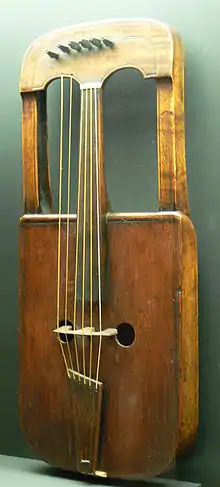crwth
See also: Crwth
English
WOTD – 23 January 2008

A crwth
Etymology
From earlier crowd, from Middle English crowde, reinforced by and cognate to Welsh crwth; ultimately from Proto-Celtic *krottos (“round thing”).
Pronunciation
- (General American) IPA(key): /kɹuθ/
- (Received Pronunciation) IPA(key): /kɹuːθ/
Audio (US) (file) - Rhymes: -uːθ
Noun
crwth (plural crwths)
- (music, historical) An archaic stringed instrument associated particularly with Wales, though once played widely in Europe, and characterized by a vaulted back and enough space for the player to stop each of the six strings on the fingerboard.
- 1895, John Frederick Rowbotham, The Troubadours and Courts of Love:
- We find in one period crwths, with the strings twanged with the right hand, and stopped above with the left, being held as we hold a violoncello to-day, but being small, on the lap.
-
Synonyms
Translations
See also
- Appendix:Glossary of chordophones
Welsh
Etymology
From Proto-Celtic *krottos (“round thing”); compare Old Irish crott (“harp, lute”).
Pronunciation
- IPA(key): /kruːθ/
Noun
crwth m (plural crythau)
Mutation
| Welsh mutation | |||
|---|---|---|---|
| radical | soft | nasal | aspirate |
| crwth | grwth | nghrwth | chrwth |
| Note: Some of these forms may be hypothetical. Not every possible mutated form of every word actually occurs. | |||
Further reading
- Angharad Fychan and Ann Parry Owen, editors (2014), “crwth”, in Geiriadur Prifysgol Cymru Online (in Welsh), University of Wales Centre for Advanced Welsh & Celtic Studies
This article is issued from Wiktionary. The text is licensed under Creative Commons - Attribution - Sharealike. Additional terms may apply for the media files.